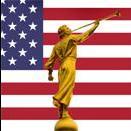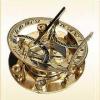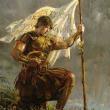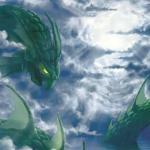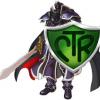-
Posts
3752 -
Joined
-
Last visited
-
Days Won
1
Reputation Activity
-
 skalenfehl got a reaction from Kryptoss in Gadianton robbers and governments
skalenfehl got a reaction from Kryptoss in Gadianton robbers and governments
Existence has always been political. The war in heaven was political. It continues today. A great chunk of the Book of Mormon was devoted to this very subject that we would be more wise than they. Unfortunately, we have not been. And a price will be paid. Yes, there are many gadiantons in seats of power today and have been for some time. A blind man can see it.
-
 skalenfehl reacted to D.PatrickTate in "The Chosen" - TV Series
skalenfehl reacted to D.PatrickTate in "The Chosen" - TV Series
Did you know that the second season of The Chosen was filmed in UTAH!!!! The first season was filmed in Texas!
I am actually Jewish or Messianic Jewish....so I deeply appreciate you Latter day Saints for providing the cast and crew of The Chosen with the stage on which this amazing series has been filmed!
-
 skalenfehl got a reaction from D.PatrickTate in "The Chosen" - TV Series
skalenfehl got a reaction from D.PatrickTate in "The Chosen" - TV Series
I LOVE this series! I own it on DVD and can't wait for Season Two, which should be out Easter or shortly thereafter. Beautiful series!
-

-
 skalenfehl got a reaction from NeedleinA in "The Chosen" - TV Series
skalenfehl got a reaction from NeedleinA in "The Chosen" - TV Series
I LOVE this series! I own it on DVD and can't wait for Season Two, which should be out Easter or shortly thereafter. Beautiful series!
-
 skalenfehl reacted to NeedleinA in "The Chosen" - TV Series
skalenfehl reacted to NeedleinA in "The Chosen" - TV Series
I apologize if this series was shared previously, I must have missed it if it was. Our family has been watching an absolutely wonder series on the Savior called "The Chosen".
It appears to have been created for VidAngel but we have been watching it both on Youtube and BYUtv. Without spoiling anything... it is about how the Savior went around choosing individuals to come follow him... individuals who might not otherwise have felt worthy or up to the task.
Looking for something to lift your spirit and see the Savior in perhaps a different light, our family gives it a thumbs up! Enjoy
-
 skalenfehl got a reaction from JohnsonJones in Etz Chaim
skalenfehl got a reaction from JohnsonJones in Etz Chaim
Hello, beautiful people!
I seldom post anymore, but I occasionally still lurk. Once in a while I just have to share something that I find meaningful. As some of you might know from my blog, I have spent a number of years studying the Book of Isaiah. Back about 2012 I was tired of not understanding 2 Nephi and skipping over it. Though I've read the Book of Mormon more times than I remember, I knew it was time to no longer take Isaiah for granted. After all, we read in 3 Nephi where Jesus Christ commands His people to study the words of Isaiah. Anyway, I have also begun to teach myself the Hebrew language and have bought a copy of the Book of Mormon in Hebrew. I love the poetry, parallelism, symbolism and other literary structures. As one who also speaks Spanish and German, I know that there are expressions that get lost in translation due to a lack of understanding cultures and thought. The more I study the Book of Mormon through a "Jewish" lens (once in a while, I interact with Jewish friends and acquaintances), the more interesting some symbols become. Nephi's books are particularly heavy in Jewish symbolism. One of the oldest symbols to the house of Israel is the "Etz Chaim" or the tree of life. Unlocking the symbolism as given to them and transmitted by them puts Lehi's vision in a new light to me. The tree of life is a physical representation of something that exists in the spirit realm. But to touch on just one aspect might encourage you to study it further if you are so inclined.
1 Nephi 8:19 And I beheld a rod of iron, and it extended along the bank of the river, and led to the tree by which I stood.
20. And I also beheld a strait and narrow path, which came along by the rod of iron, even to the tree by which I stood; and it also led by the head of the fountain, unto a large and spacious field, as if it had been a world.
Traditionally, latter-day saints view the iron rod in terms of residential or commercial applications, like a hand rail. But in Jewish thought, the rod is an offshoot that extends from the tree of life that grows away and along the path beside the river of water to welcome and guide sojourners who seek eternal life. This "iron branch" sounds odd to our modern minds, but to Israelite minds, it's very apt. Consider Isaiah:
Isaiah 11:1 And there shall come forth a rod out of the stem of Jesse, and a Branch shall grow out of his roots...
Coming from the Jews, Nephi's use of the iron rod to represent the "word" of God is also used by the apostle John:
John 1:1 In the beginning was the Word, and the Word was with God, and the Word was God.
Stated differently, Yeshua HaMaschiach (Jesus the Messiah) is the Word of God made flesh. He is the Word, or the Living Torah. We hold to HIM along the strait and narrow path in order to obtain eternal life. I love the notion of holding to Jesus Christ (not just words from prophets or scripture) as I make my way through life. I just wanted to share this little tidbit with you all. Hopefully this fresh perspective excites you as much as it does me. ♥️
-
 skalenfehl got a reaction from Anddenex in Etz Chaim
skalenfehl got a reaction from Anddenex in Etz Chaim
Hello, beautiful people!
I seldom post anymore, but I occasionally still lurk. Once in a while I just have to share something that I find meaningful. As some of you might know from my blog, I have spent a number of years studying the Book of Isaiah. Back about 2012 I was tired of not understanding 2 Nephi and skipping over it. Though I've read the Book of Mormon more times than I remember, I knew it was time to no longer take Isaiah for granted. After all, we read in 3 Nephi where Jesus Christ commands His people to study the words of Isaiah. Anyway, I have also begun to teach myself the Hebrew language and have bought a copy of the Book of Mormon in Hebrew. I love the poetry, parallelism, symbolism and other literary structures. As one who also speaks Spanish and German, I know that there are expressions that get lost in translation due to a lack of understanding cultures and thought. The more I study the Book of Mormon through a "Jewish" lens (once in a while, I interact with Jewish friends and acquaintances), the more interesting some symbols become. Nephi's books are particularly heavy in Jewish symbolism. One of the oldest symbols to the house of Israel is the "Etz Chaim" or the tree of life. Unlocking the symbolism as given to them and transmitted by them puts Lehi's vision in a new light to me. The tree of life is a physical representation of something that exists in the spirit realm. But to touch on just one aspect might encourage you to study it further if you are so inclined.
1 Nephi 8:19 And I beheld a rod of iron, and it extended along the bank of the river, and led to the tree by which I stood.
20. And I also beheld a strait and narrow path, which came along by the rod of iron, even to the tree by which I stood; and it also led by the head of the fountain, unto a large and spacious field, as if it had been a world.
Traditionally, latter-day saints view the iron rod in terms of residential or commercial applications, like a hand rail. But in Jewish thought, the rod is an offshoot that extends from the tree of life that grows away and along the path beside the river of water to welcome and guide sojourners who seek eternal life. This "iron branch" sounds odd to our modern minds, but to Israelite minds, it's very apt. Consider Isaiah:
Isaiah 11:1 And there shall come forth a rod out of the stem of Jesse, and a Branch shall grow out of his roots...
Coming from the Jews, Nephi's use of the iron rod to represent the "word" of God is also used by the apostle John:
John 1:1 In the beginning was the Word, and the Word was with God, and the Word was God.
Stated differently, Yeshua HaMaschiach (Jesus the Messiah) is the Word of God made flesh. He is the Word, or the Living Torah. We hold to HIM along the strait and narrow path in order to obtain eternal life. I love the notion of holding to Jesus Christ (not just words from prophets or scripture) as I make my way through life. I just wanted to share this little tidbit with you all. Hopefully this fresh perspective excites you as much as it does me. ♥️
-
 skalenfehl got a reaction from Traveler in Etz Chaim
skalenfehl got a reaction from Traveler in Etz Chaim
Hello, beautiful people!
I seldom post anymore, but I occasionally still lurk. Once in a while I just have to share something that I find meaningful. As some of you might know from my blog, I have spent a number of years studying the Book of Isaiah. Back about 2012 I was tired of not understanding 2 Nephi and skipping over it. Though I've read the Book of Mormon more times than I remember, I knew it was time to no longer take Isaiah for granted. After all, we read in 3 Nephi where Jesus Christ commands His people to study the words of Isaiah. Anyway, I have also begun to teach myself the Hebrew language and have bought a copy of the Book of Mormon in Hebrew. I love the poetry, parallelism, symbolism and other literary structures. As one who also speaks Spanish and German, I know that there are expressions that get lost in translation due to a lack of understanding cultures and thought. The more I study the Book of Mormon through a "Jewish" lens (once in a while, I interact with Jewish friends and acquaintances), the more interesting some symbols become. Nephi's books are particularly heavy in Jewish symbolism. One of the oldest symbols to the house of Israel is the "Etz Chaim" or the tree of life. Unlocking the symbolism as given to them and transmitted by them puts Lehi's vision in a new light to me. The tree of life is a physical representation of something that exists in the spirit realm. But to touch on just one aspect might encourage you to study it further if you are so inclined.
1 Nephi 8:19 And I beheld a rod of iron, and it extended along the bank of the river, and led to the tree by which I stood.
20. And I also beheld a strait and narrow path, which came along by the rod of iron, even to the tree by which I stood; and it also led by the head of the fountain, unto a large and spacious field, as if it had been a world.
Traditionally, latter-day saints view the iron rod in terms of residential or commercial applications, like a hand rail. But in Jewish thought, the rod is an offshoot that extends from the tree of life that grows away and along the path beside the river of water to welcome and guide sojourners who seek eternal life. This "iron branch" sounds odd to our modern minds, but to Israelite minds, it's very apt. Consider Isaiah:
Isaiah 11:1 And there shall come forth a rod out of the stem of Jesse, and a Branch shall grow out of his roots...
Coming from the Jews, Nephi's use of the iron rod to represent the "word" of God is also used by the apostle John:
John 1:1 In the beginning was the Word, and the Word was with God, and the Word was God.
Stated differently, Yeshua HaMaschiach (Jesus the Messiah) is the Word of God made flesh. He is the Word, or the Living Torah. We hold to HIM along the strait and narrow path in order to obtain eternal life. I love the notion of holding to Jesus Christ (not just words from prophets or scripture) as I make my way through life. I just wanted to share this little tidbit with you all. Hopefully this fresh perspective excites you as much as it does me. ♥️
-
 skalenfehl got a reaction from askandanswer in Etz Chaim
skalenfehl got a reaction from askandanswer in Etz Chaim
Hello, beautiful people!
I seldom post anymore, but I occasionally still lurk. Once in a while I just have to share something that I find meaningful. As some of you might know from my blog, I have spent a number of years studying the Book of Isaiah. Back about 2012 I was tired of not understanding 2 Nephi and skipping over it. Though I've read the Book of Mormon more times than I remember, I knew it was time to no longer take Isaiah for granted. After all, we read in 3 Nephi where Jesus Christ commands His people to study the words of Isaiah. Anyway, I have also begun to teach myself the Hebrew language and have bought a copy of the Book of Mormon in Hebrew. I love the poetry, parallelism, symbolism and other literary structures. As one who also speaks Spanish and German, I know that there are expressions that get lost in translation due to a lack of understanding cultures and thought. The more I study the Book of Mormon through a "Jewish" lens (once in a while, I interact with Jewish friends and acquaintances), the more interesting some symbols become. Nephi's books are particularly heavy in Jewish symbolism. One of the oldest symbols to the house of Israel is the "Etz Chaim" or the tree of life. Unlocking the symbolism as given to them and transmitted by them puts Lehi's vision in a new light to me. The tree of life is a physical representation of something that exists in the spirit realm. But to touch on just one aspect might encourage you to study it further if you are so inclined.
1 Nephi 8:19 And I beheld a rod of iron, and it extended along the bank of the river, and led to the tree by which I stood.
20. And I also beheld a strait and narrow path, which came along by the rod of iron, even to the tree by which I stood; and it also led by the head of the fountain, unto a large and spacious field, as if it had been a world.
Traditionally, latter-day saints view the iron rod in terms of residential or commercial applications, like a hand rail. But in Jewish thought, the rod is an offshoot that extends from the tree of life that grows away and along the path beside the river of water to welcome and guide sojourners who seek eternal life. This "iron branch" sounds odd to our modern minds, but to Israelite minds, it's very apt. Consider Isaiah:
Isaiah 11:1 And there shall come forth a rod out of the stem of Jesse, and a Branch shall grow out of his roots...
Coming from the Jews, Nephi's use of the iron rod to represent the "word" of God is also used by the apostle John:
John 1:1 In the beginning was the Word, and the Word was with God, and the Word was God.
Stated differently, Yeshua HaMaschiach (Jesus the Messiah) is the Word of God made flesh. He is the Word, or the Living Torah. We hold to HIM along the strait and narrow path in order to obtain eternal life. I love the notion of holding to Jesus Christ (not just words from prophets or scripture) as I make my way through life. I just wanted to share this little tidbit with you all. Hopefully this fresh perspective excites you as much as it does me. ♥️
-
 skalenfehl got a reaction from Fether in Etz Chaim
skalenfehl got a reaction from Fether in Etz Chaim
Hello, beautiful people!
I seldom post anymore, but I occasionally still lurk. Once in a while I just have to share something that I find meaningful. As some of you might know from my blog, I have spent a number of years studying the Book of Isaiah. Back about 2012 I was tired of not understanding 2 Nephi and skipping over it. Though I've read the Book of Mormon more times than I remember, I knew it was time to no longer take Isaiah for granted. After all, we read in 3 Nephi where Jesus Christ commands His people to study the words of Isaiah. Anyway, I have also begun to teach myself the Hebrew language and have bought a copy of the Book of Mormon in Hebrew. I love the poetry, parallelism, symbolism and other literary structures. As one who also speaks Spanish and German, I know that there are expressions that get lost in translation due to a lack of understanding cultures and thought. The more I study the Book of Mormon through a "Jewish" lens (once in a while, I interact with Jewish friends and acquaintances), the more interesting some symbols become. Nephi's books are particularly heavy in Jewish symbolism. One of the oldest symbols to the house of Israel is the "Etz Chaim" or the tree of life. Unlocking the symbolism as given to them and transmitted by them puts Lehi's vision in a new light to me. The tree of life is a physical representation of something that exists in the spirit realm. But to touch on just one aspect might encourage you to study it further if you are so inclined.
1 Nephi 8:19 And I beheld a rod of iron, and it extended along the bank of the river, and led to the tree by which I stood.
20. And I also beheld a strait and narrow path, which came along by the rod of iron, even to the tree by which I stood; and it also led by the head of the fountain, unto a large and spacious field, as if it had been a world.
Traditionally, latter-day saints view the iron rod in terms of residential or commercial applications, like a hand rail. But in Jewish thought, the rod is an offshoot that extends from the tree of life that grows away and along the path beside the river of water to welcome and guide sojourners who seek eternal life. This "iron branch" sounds odd to our modern minds, but to Israelite minds, it's very apt. Consider Isaiah:
Isaiah 11:1 And there shall come forth a rod out of the stem of Jesse, and a Branch shall grow out of his roots...
Coming from the Jews, Nephi's use of the iron rod to represent the "word" of God is also used by the apostle John:
John 1:1 In the beginning was the Word, and the Word was with God, and the Word was God.
Stated differently, Yeshua HaMaschiach (Jesus the Messiah) is the Word of God made flesh. He is the Word, or the Living Torah. We hold to HIM along the strait and narrow path in order to obtain eternal life. I love the notion of holding to Jesus Christ (not just words from prophets or scripture) as I make my way through life. I just wanted to share this little tidbit with you all. Hopefully this fresh perspective excites you as much as it does me. ♥️
-
 skalenfehl reacted to Rimon in GA made a bold prediction
skalenfehl reacted to Rimon in GA made a bold prediction
Well, you didn’t need to share it to the online world if you truly believed he shouldn’t have shared it with you. That’s not cool.
-
 skalenfehl got a reaction from Moonbeast32 in Latter-day Lamanite: My Blog
skalenfehl got a reaction from Moonbeast32 in Latter-day Lamanite: My Blog
My other blog thread was archived (it was really starting to get old) and I pondered starting another one. I have been experiencing much and there is much I want to share in the future as the Lord directs.
This entry was a labor of love: Lecturas Sobre la Fe
-
 skalenfehl reacted to Vort in Who Named the Book of Mormon?
skalenfehl reacted to Vort in Who Named the Book of Mormon?
I would be very much opposed to any such thing, though if the leadership found it appropriate (for whatever bizarre reason) to do so, I would not voice a complaint. They appended "Another Testament of Jesus Christ" to the title thirty or forty years ago, and I haven't complained publicly about that. But from where I'm sitting, "The Book of Mormon" appears to be the perfect name for the book.
-
 skalenfehl got a reaction from Jersey Boy in God ceasing to be God
skalenfehl got a reaction from Jersey Boy in God ceasing to be God
Ok, Mores, let's have a discussion. I don't disagree with you that Jesus laid down His own life. He also didn't just climb up on the cross and ask someone to nail Him to it. So why bother with the process of allowing wicked men to unjustly accuse Him and unjustly put Him on the cross?
-
 skalenfehl got a reaction from Anddenex in God ceasing to be God
skalenfehl got a reaction from Anddenex in God ceasing to be God
Justice cannot be robbed. The wages of sin is death (Romans 6:23) but because Jesus was sinless, and being God, having eternal life, what was unjustly taken from Him was His life, which is eternal and infinite, having no end. And while God’s own justice must reject evil, which has no place in His kingdom, His own sacrifice makes possible His right of mercy.
Alma 34:9 For it is expedient that an atonement should be made; for according to the great plan of the Eternal God there must be an atonement made, or else all mankind must unavoidably perish; yea, all are hardened; yea, all are fallen and are lost, and must perish except it be through the atonement which it is expedient should be made.
10 For it is expedient that there should be a great and last sacrifice; yea, not a sacrifice of man, neither of beast, neither of any manner of fowl; for it shall not be a human sacrifice; but it must be an infinite and eternal sacrifice.
11 Now there is not any man that can sacrifice his own blood which will atone for the sins of another. Now, if a man murdereth, behold will our law, which is just, take the life of his brother? I say unto you, Nay.
12 But the law requireth the life of him who hath murdered; therefore there can be nothing which is short of an infinite atonement which will suffice for the sins of the world.
13 Therefore, it is expedient that there should be a great and last sacrifice, and then shall there be, or it is expedient there should be, a stop to the shedding of blood; then shall the law of Moses be fulfilled; yea, it shall be all fulfilled, every jot and tittle, and none shall have passed away.
Justice can demand of us death, and rightly so, for the wages of sin is death. But Jesus Christ who is our mediator (1 Timothy 2:5) and our intercessor (Hebrews 7:25) with the Father can, in effect, hold back justice and say to it, “you took from me my life, which is endless and infinite. Therefore, in restoring to myself what is infinite, I can claim ALL life.” Thus justice is necessarily satisfied. This is how God can continue to be God, having satisfied the demands of justice, which has claim on all of us sinners. It was necessary for Him to make such a condescension, with the capacity to die unjustly so that He could take up His life again and in that capacity, which is infinite, rescue the rest of us.
-
 skalenfehl got a reaction from dprh in God ceasing to be God
skalenfehl got a reaction from dprh in God ceasing to be God
Justice cannot be robbed. The wages of sin is death (Romans 6:23) but because Jesus was sinless, and being God, having eternal life, what was unjustly taken from Him was His life, which is eternal and infinite, having no end. And while God’s own justice must reject evil, which has no place in His kingdom, His own sacrifice makes possible His right of mercy.
Alma 34:9 For it is expedient that an atonement should be made; for according to the great plan of the Eternal God there must be an atonement made, or else all mankind must unavoidably perish; yea, all are hardened; yea, all are fallen and are lost, and must perish except it be through the atonement which it is expedient should be made.
10 For it is expedient that there should be a great and last sacrifice; yea, not a sacrifice of man, neither of beast, neither of any manner of fowl; for it shall not be a human sacrifice; but it must be an infinite and eternal sacrifice.
11 Now there is not any man that can sacrifice his own blood which will atone for the sins of another. Now, if a man murdereth, behold will our law, which is just, take the life of his brother? I say unto you, Nay.
12 But the law requireth the life of him who hath murdered; therefore there can be nothing which is short of an infinite atonement which will suffice for the sins of the world.
13 Therefore, it is expedient that there should be a great and last sacrifice, and then shall there be, or it is expedient there should be, a stop to the shedding of blood; then shall the law of Moses be fulfilled; yea, it shall be all fulfilled, every jot and tittle, and none shall have passed away.
Justice can demand of us death, and rightly so, for the wages of sin is death. But Jesus Christ who is our mediator (1 Timothy 2:5) and our intercessor (Hebrews 7:25) with the Father can, in effect, hold back justice and say to it, “you took from me my life, which is endless and infinite. Therefore, in restoring to myself what is infinite, I can claim ALL life.” Thus justice is necessarily satisfied. This is how God can continue to be God, having satisfied the demands of justice, which has claim on all of us sinners. It was necessary for Him to make such a condescension, with the capacity to die unjustly so that He could take up His life again and in that capacity, which is infinite, rescue the rest of us.
-
 skalenfehl reacted to mikbone in Any guesses on the grand things?
skalenfehl reacted to mikbone in Any guesses on the grand things?
Yes, many times.
I refuse to call it the King Follett Discourse or even worse, the KFD.
I refer to it as Joseph Smith’s final general conference talk of April 7, 1844.
The other title is a travesty. Even worse then calling Latter-Day Saints Mormons.
/gasp
I could go on and on about the address, maybe another time...
-

-
 skalenfehl reacted to SpiritDragon in Whom do we worship?
skalenfehl reacted to SpiritDragon in Whom do we worship?
Thanks for working to clarify your position. I'll have to go back and read/reread all your posts and see if I can't get a better understanding of your perspective.
-
 skalenfehl got a reaction from SpiritDragon in Whom do we worship?
skalenfehl got a reaction from SpiritDragon in Whom do we worship?
Hello, SpiritDragon. No, I am not suggesting that they are one and the same body. They are two distinct, glorified individuals.
-
 skalenfehl got a reaction from mikbone in Whom do we worship?
skalenfehl got a reaction from mikbone in Whom do we worship?
This is all the approved pattern I need:
and
Nothing subtle about it. Bold, straightforward and precise. Straight from Jesus Christ's own mouth. I am a disciple of Jesus Christ. I know these are Jesus Christ's words. He is the Father. They are true. He invites both Gentile and house of Israel to rend the veil of unbelief and know Him. That means know Him personally, not just about Him. Nobody is exempt--especially members of the church.
-
 skalenfehl got a reaction from mikbone in Jehovah's unique character
skalenfehl got a reaction from mikbone in Jehovah's unique character
May I suggest the word "character" and/or "attributes" rather than "nature?" The natural man is an enemy to God. Jesus Christ is no longer natural. Although nature can include attributes and characteristics, it also implies belonging to the physical, natural world, of which Jehovah is not. It may be why the Lectures on Faith does not use the word nature when describing the attributes and character when describing the correct ideas of God.
-
 skalenfehl got a reaction from SpiritDragon in Whom do we worship?
skalenfehl got a reaction from SpiritDragon in Whom do we worship?
That is spot on, @SpiritDragon. Yes, Abraham claimed the right of a "father" along with all the other patriarchs prior to the flood. It is through Abraham that all generations of the earth after him are blessed. It is also why the sacrifice required of him was so extreme and how symbolic it was of the sacrifice of our Savior, Jesus Christ. I don't know why Abraham's trial was so difficult compared to that of the others, but I can only speculate that his "succession" was so far out of turn, that the Lord truly tested his willingness to make that claim. Thus, Isaac and Jacob also became "fathers" and why the three are typically mentioned together in succession, Jacob (or Israel) being the father of twelve nations. A few examples:
-
 skalenfehl got a reaction from Anddenex in Whom do we worship?
skalenfehl got a reaction from Anddenex in Whom do we worship?
@Anddenex, I'm on my cell, so my answer must be brief. If you read everything I shared in this thread including my pdf link, you will see that I have already addressed this. If it's still unclear, I'll try and clarity when I get home to my computer. Cheers.






